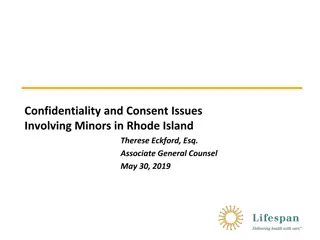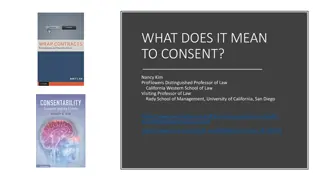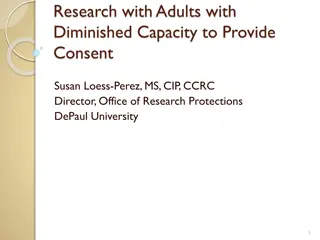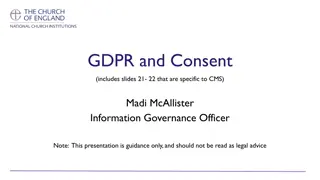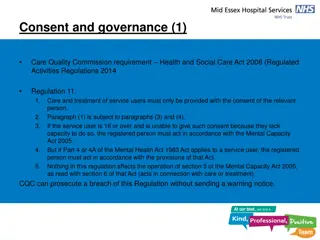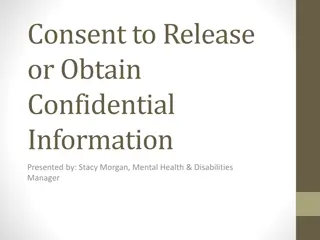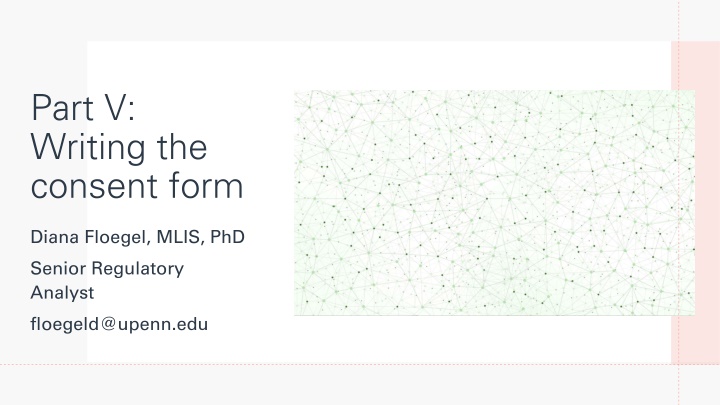
Writing the Research Consent Form: Essential Guidelines and Requirements
Learn the crucial elements required for crafting a research consent form, including types of consent, participant rights, PHI protections, enrolling minors, and when consent waivers may apply. Get insights on HIPAA authorization, voluntary participation, study duration, risks, benefits, and contact information for researchers.
Uploaded on | 0 Views
Download Presentation

Please find below an Image/Link to download the presentation.
The content on the website is provided AS IS for your information and personal use only. It may not be sold, licensed, or shared on other websites without obtaining consent from the author. If you encounter any issues during the download, it is possible that the publisher has removed the file from their server.
You are allowed to download the files provided on this website for personal or commercial use, subject to the condition that they are used lawfully. All files are the property of their respective owners.
The content on the website is provided AS IS for your information and personal use only. It may not be sold, licensed, or shared on other websites without obtaining consent from the author.
E N D
Presentation Transcript
Part V: Writing the consent form Diana Floegel, MLIS, PhD Senior Regulatory Analyst floegeld@upenn.edu
Types of consent Written (a signature line) Required for studies that are greater than minimal risk Verbal Can offer a written statement of research to participants Electronic Checkbox, next button Passive Opt-out Only permissible in certain cases
Identify that this is a research study State that participation is voluntary Provide a summary of the study and its purpose What do you need in a consent form or script? List how long the study will last and how many people will be enrolled State your methods and procedures State risks (breach of confidentiality) and benefits State other options rather than participating Whether there are any costs and whether participants will be paid Why participation may stop Who can see the information provided How privacy will be protected Whether any future research will occur with data Provide contact information for the researcher(s) and Penn IRB (215-898-2614)
List of protected health information (PHI) collected as part of the study What are the required elements of HIPAA authorization? Who may use and disclose PHI Who may receive the information Duration of the authorization or no expiration Right to revoke authorization Information disclosed outside of the covered entity may not be protected
What if you will enroll children/minors? In most cases, you need: A process for obtaining assent (consent from minors) We have a template on our website! A process for obtaining parental permission In certain cases, you can waive parental permission Example: It is impossible to obtain Example: Obtaining permission may harm the child more than the research (e.g., outing a child) Contact a Senior Analyst with questions or sign up for office hours!
Can you waive consent? In most cases, no You can waive consent if: It is impracticable to obtain informed consent Doing so will not impact the rights and welfare of participants You have appropriate privacy and confidentiality plans in place If possible, you have plans to debrief people in the future Common examples of studies with consent waivers: Retrospective chart review (Penn Medicine) Nudge trials Access to secondary data sets that contain identifying information
When can you waive HIPAA authorization? Use of protected health information (PHI) involves no more than minimal risk to the privacy of individuals Adequate plan to protect PHI from improper use and disclosure Adequate plan to destroy PHI at the earliest opportunity Adequate assurances that PHI will not be reused or disclosed unless permitted Research is not practicable without the waiver or alteration Research is not practicable without access to and use of PHI
Questions? Sign up for office hours or contact a senior analyst!







